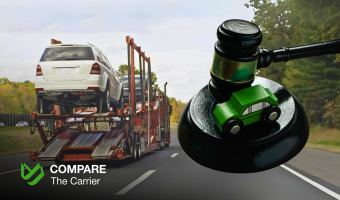So, you’re thinking about diving into the exciting world of car auctions, huh?
Good for you!
It’s a fantastic way to potentially snag a sweet ride for a fraction of the price you’d pay at a dealership. But let’s be real – if you’re a first-timer, it can feel a bit like stepping into the Wild West.
Don’t sweat it, though. This guide is packed with insider car auction tips to help you navigate the bidding wars, avoid rookie mistakes, and drive off with a deal that’ll make your friends jealous.
We’ll walk you through everything you need to know, from understanding the different types of auctions and how to get an auction license (if you need one), to inspecting cars, setting a budget, and mastering the art of bidding. We’ll even cover those pesky car auction fees for buyers so there are no surprises.
Whether you’re hunting for a used car bargain or a classic gem, we’ll show you how to buy cars at auction with confidence. Consider this your crash course in “Car Auctions 101” – we’re here to make sure your first auction experience is a successful one. Buckle up, it’s gonna be a fun ride!
How Do Car Auctions Work?
Okay, so you’ve decided to dip your toes into the exciting world of car auctions. Smart move!
But before you jump in headfirst, let’s get you familiar with the lay of the land. Car auctions, while potentially lucrative, have their own set of rules and rhythms.
At its core, a car auction is a fast-paced marketplace where vehicles are sold to the highest bidder. It’s a bit like a high-stakes game of “who wants it more?” but with cars instead of cookie jars.
Now, there are a few different flavors of car auctions you might encounter:
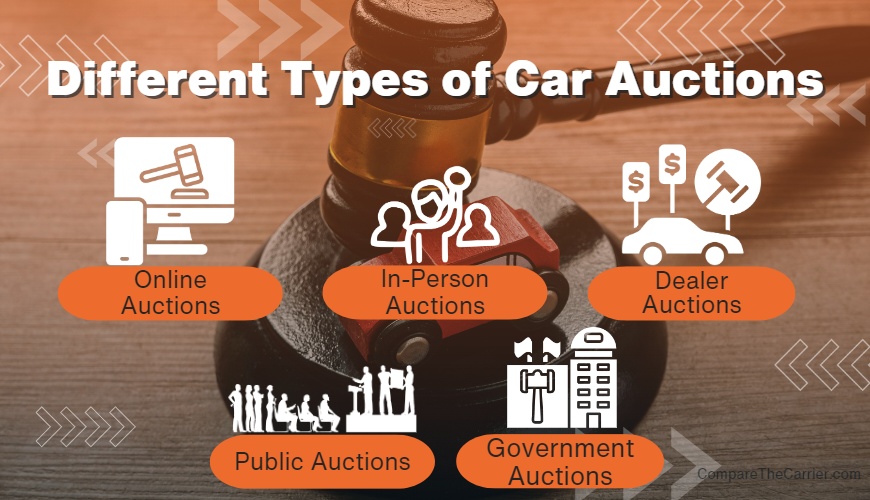
No matter which type of auction you choose, understanding the specific rules and regulations is key. Some auctions may require you to obtain an auction license before you can bid. Others may have specific car auction fees for buyers that you’ll need to factor into your budget. Do your homework beforehand so you’re not caught off guard.
Here’s a quick rundown of the typical auction process:
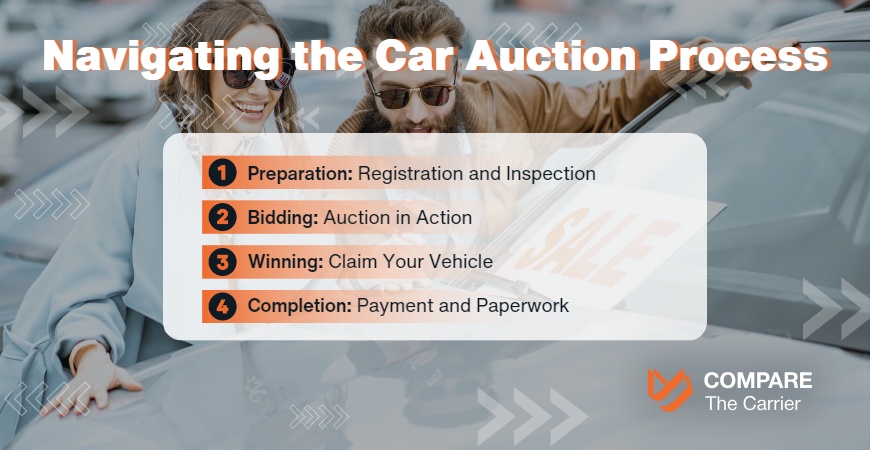
Sounds simple enough, right?
Well, it can be, but there are definitely some insider car auction tips and strategies that can help you navigate the process like a pro.
We’ll dive deeper into those in the next sections, but for now, just remember – knowledge is power in the auction world!
Preparing for Your First Auction: Laying the Groundwork for a Winning Bid
Alright, now that you understand the basics of how car auctions work, it’s time to roll up your sleeves and get ready for the big day.
Remember, success at an auction isn’t just about showing up and waving your bidder paddle around. It’s about strategy, preparation, and a little bit of savvy.
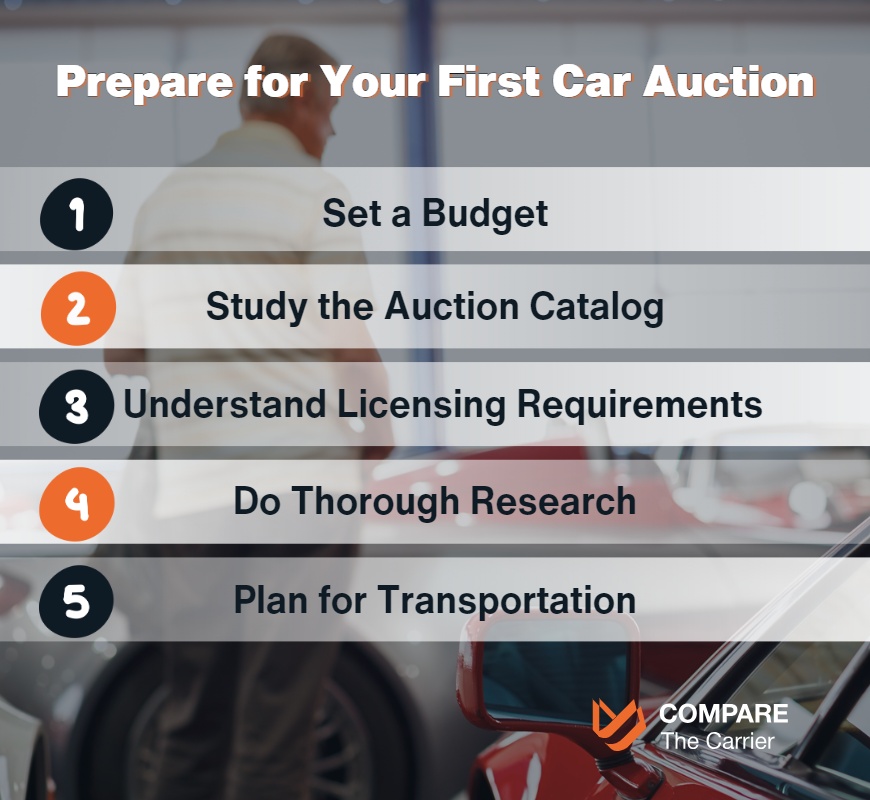
If you’re considering bidding on a car from an auction across the country, it’s crucial to understand the logistics of cross country auto transportation to factor in the costs and planning required.
Remember, the goal of preparing for an auction isn’t just about winning a bid, it’s about winning the right bid – one that gets you a car you love at a price you can afford. So take your time, do your research, and go into the auction with a clear head and a solid plan. You got this!
Inspection Day Essentials: Don’t Miss a Thing!
Alright, you’ve done your homework, set your budget, and even got that auction license if needed. Now it’s time for the main event: inspection day. This is your chance to get up close and personal with the cars you’re considering bidding on. Think of it as a first date – you want to make a good impression, but you also want to make sure they’re everything they claim to be.
First off, arrive early and come prepared. Auctions can get crowded, and you don’t want to be rushed or miss out on inspecting a potential gem. Bring a flashlight, a notepad, and a magnet (to check for body filler, a common sign of previous damage). If you’re mechanically inclined, consider bringing some basic tools to do a more thorough check. And if you’re not mechanically inclined, don’t be afraid to bring a trusted mechanic along for a second opinion.
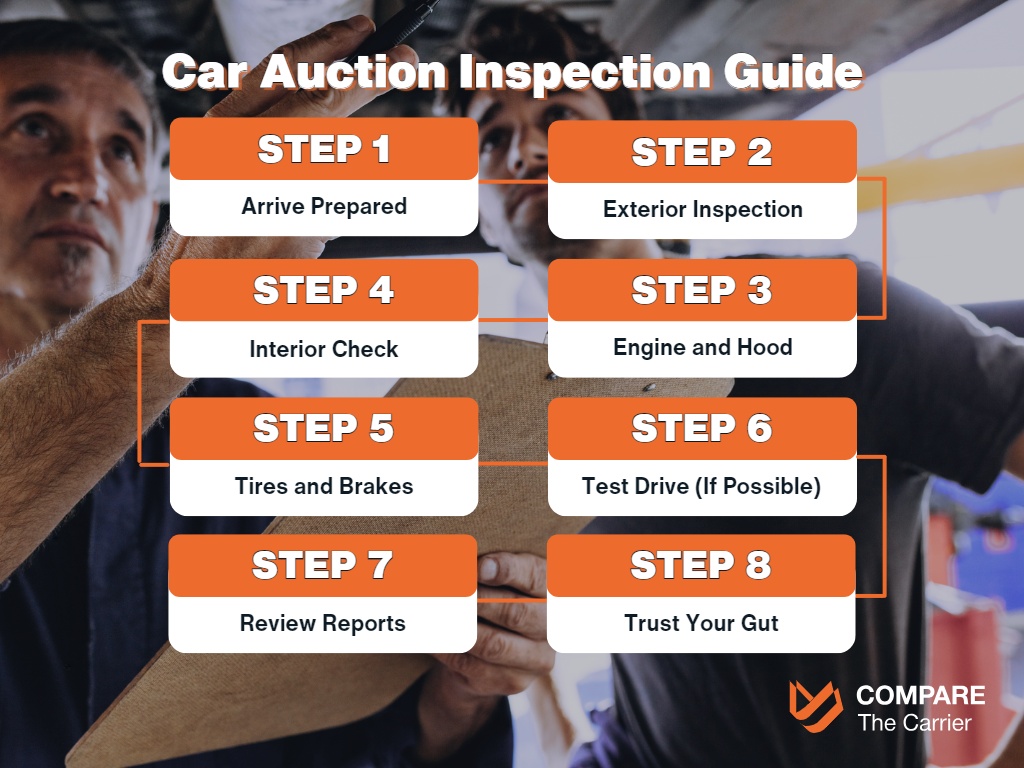
Now, for the inspection itself. Don’t be shy – you’re entitled to a good look! Here’s a basic checklist to get you started:
In addition to your physical inspection, don’t forget to do your due diligence on paper:
Remember, knowledge is power when buying a used car. Arm yourself with information, inspect thoroughly, and don’t be afraid to walk away if something doesn’t feel right. A car auction can be a great place to find a deal, but only if you’re a savvy and informed buyer.
Auction License Basics: Who Needs One and How to Get It
Alright, let’s tackle a bit of red tape, shall we? While most public car auctions are open to anyone with a hankering for a good deal, there are certain scenarios where you might need a special license to participate. Think of it like a VIP pass to the bidding floor.
So, who needs an auction license?
Okay, but how do you get one of these magical licenses?
Remember, even if you don’t need a license to buy at a specific auction, obtaining one can open doors to dealer-only auctions, where you might find even better deals. It’s an investment that can pay off in the long run if you plan on buying and selling cars regularly.
And hey, if all this talk of licenses and paperwork is making your head spin, don’t worry. There are plenty of resources available to help you navigate the process. Check out websites like the National Independent Automobile Dealers Association (NIADA) or your state’s Independent Automobile Dealers Association for more information and guidance on how to get an auction license to buy cars.
Remember, knowledge is power! Understanding the licensing requirements upfront will save you time and hassle down the road. So do your research, get your ducks in a row, and get ready to bid with confidence!
Bidding Tips for Beginners: Stay Cool Under Pressure
Alright, you’ve done your research, you’ve inspected your favorite cars, and now it’s time for the heart-pounding moment: the bidding.
When the auction heat rises, remember who’s boss!

Stick to your budget, no matter how tempting the bids get!
Picture this: the auctioneer’s rapid-fire chant, the crowd buzzing with anticipation, the adrenaline coursing through your veins. It’s easy to get caught up in the excitement, but remember, keeping a cool head is crucial to snagging a good deal at a car auction.
Before you place your bid, it’s wise to familiarize yourself with an auction car shipping guide to understand the logistics and costs involved post-auction.
Here’s a friendly reminder: emotions can run high at auctions, leading to impulsive decisions and overbidding. It’s essential to remember that there will always be other cars, other auctions. Don’t let the fear of missing out cloud your judgment. Stick to your budget and walk away if the bidding goes beyond your limit.
Now, let’s explore some tried-and-true bidding tips to help you navigate the auction floor (or online platform) with confidence:
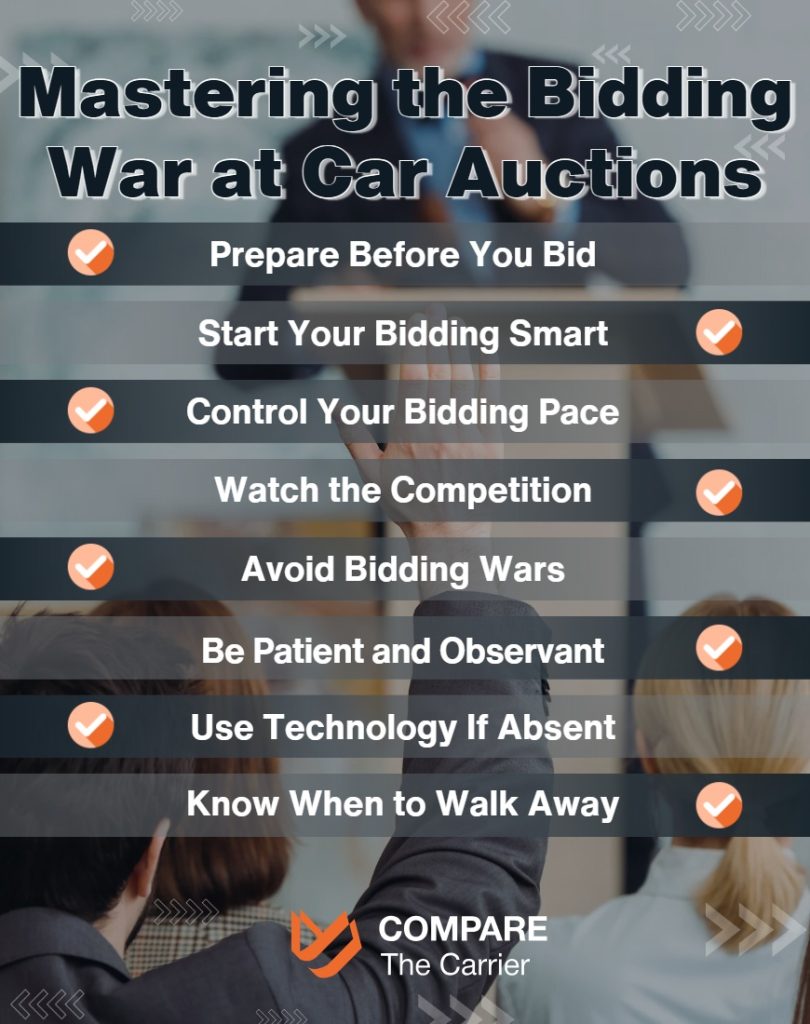
By following these car auction tips and keeping a level head, you’ll increase your chances of scoring a great deal on your next used car. Happy bidding!
Post-Auction Process: Sealing the Deal
Alright, the gavel’s dropped, the dust has settled, and you’re the proud new owner of a shiny (or maybe not-so-shiny) set of wheels. Congratulations!
But hold your horses, the auction isn’t quite over yet. There’s still some important paperwork and logistics to handle before you can hit the open road.
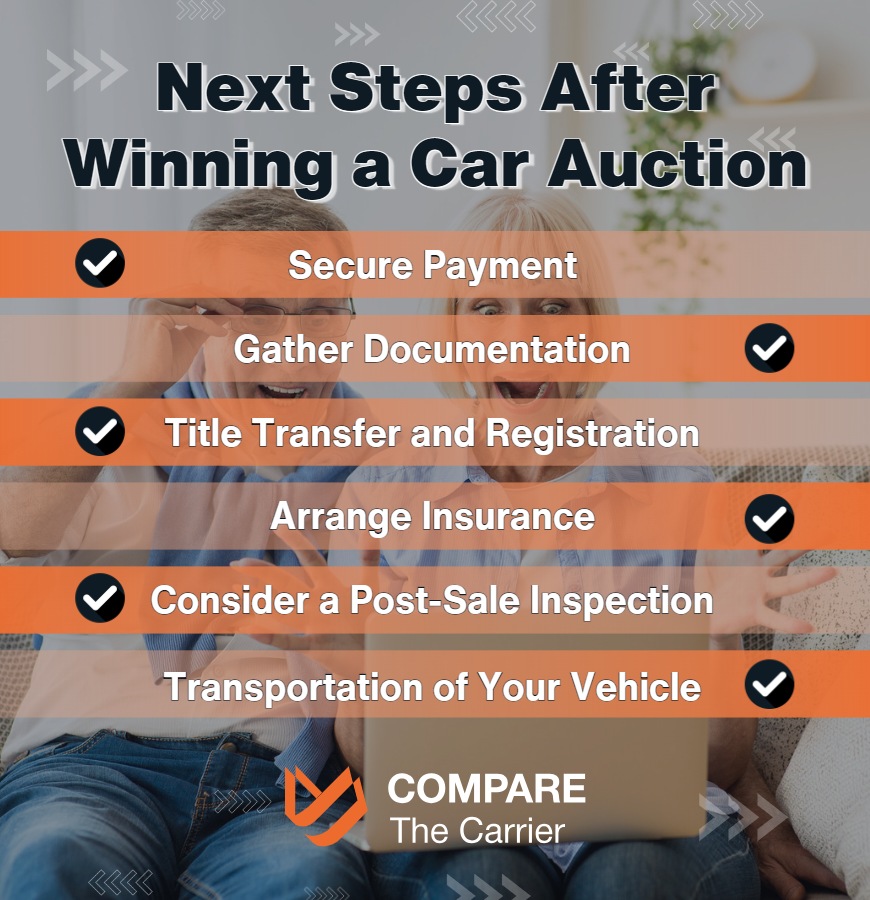
Let’s break down the post-auction process so you know what to expect:
And finally, let’s not forget about getting your new ride home. If you’re not planning on driving it yourself, you’ll need to arrange transportation.
That’s where a reliable car shipping service can come in handy. They can handle all the logistics, ensuring your car arrives safely and on time. (Shameless plug: Compare The Carrier is a great option for finding competitive quotes and reliable transporters. 😉)
If you’ve purchased a vehicle from a dealership through an auction, you can learn more about shipping cars from dealers to ensure a smooth process.
The post-auction process might seem a bit overwhelming at first, but it’s all part of the journey to becoming a proud car owner.
Just take it one step at a time, stay organized, and don’t be afraid to ask questions if you’re unsure about anything. And remember, once you’ve completed all the necessary steps, you can finally hit the road and enjoy the fruits of your auction success!
Transporting Your Auction Car: Getting it Home Safe and Sound
Alright, you’ve successfully navigated the auction, won your bid, and completed the paperwork. Now comes the exciting part—getting your new ride home. Whether it’s a classic beauty, a practical daily driver, or a project car waiting for your personal touch, ensuring its safe arrival is paramount.
First things first, consider the distance and your comfort level. If the auction is local and you’re confident behind the wheel, driving it home might be the most straightforward option. However, if you’re dealing with long-distance transport, consider all your options, including state-to-state vehicle towing to ensure your new purchase arrives safely.
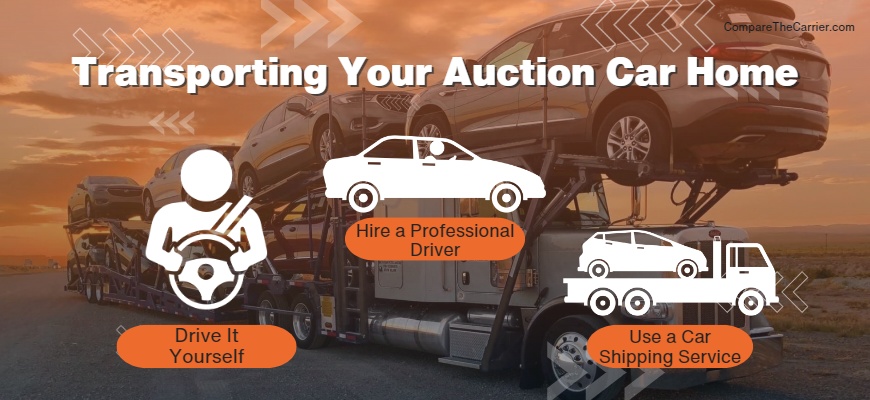
Option 1: Drive it Yourself:
This is the DIY approach, offering the most control and often the quickest turnaround. However, it’s crucial to ensure the vehicle is roadworthy and you’re up for the journey. Factor in fuel costs, potential overnight stays, and the wear and tear on both yourself and the car.
Option 2: Hire a Professional Driver:
If you’re not comfortable driving the car yourself or the distance is considerable, consider hiring a professional driver. This can be a convenient option, especially if the vehicle requires special handling or you’re short on time. Do your research to find a reputable driver with experience transporting vehicles from auctions.
Option 3: Use a Car Shipping Service:
For long-distance transport or added peace of mind, a car shipping service is your best bet. These companies specialize in transporting vehicles safely and efficiently, often offering door-to-door service and insurance coverage. When choosing a provider, consider factors like cost, reputation, insurance options, and estimated delivery time.
If you decide to ship your vehicle, you might choose an open vehicle transport option for cost-effectiveness, especially if you’re looking for a standard solution that doesn’t require additional protection.
For classic cars or vehicles that require extra care, enclosed car haulers provide additional protection against the elements and potential road hazards. Consider these top-rated enclosed car shipping companies to ensure your car arrives in pristine condition.
Psst… remember us? Compare The Carrier can help you find the best car shipping deals, saving you time and money. And to get an accurate estimate of how much shipping your auction car will cost, use our vehicle shipping calculator to plan your budget effectively.
‘‘
Here’s a quick comparison of your options:
Option | Pros | Cons |
Drive it Yourself | Most control, potentially quickest, no additional cost | Time-consuming for long distances, potential wear and tear on car |
Hire a Driver | Convenient, especially for special handling or long distances | Can be expensive, less control over the transport process |
Car Shipping | Safe and efficient, door-to-door service, insurance options | Can be more expensive than driving yourself, longer delivery time |
No matter which option you choose, be sure to do your research and compare quotes. Ask about insurance coverage, tracking options, and any additional fees that may apply. Remember, your newly acquired treasure deserves the best care during its journey home.
For those who need their vehicle transported urgently or internationally, consider the option of shipping cars by plane to save time and reduce the risk of damage.
So, there you have it – a breakdown of your options for transporting your auction car. Now, go forth and enjoy the fruits of your bidding victory!
Conclusion
So, there you have it – your crash course in navigating the exciting world of car auctions. It might seem a bit daunting at first, but armed with the right knowledge and a bit of preparation, you can confidently step into the auction arena and potentially drive away with a fantastic deal.
Remember, car auctions aren’t just for seasoned pros. They’re for anyone seeking a unique car-buying experience and the chance to snag a quality vehicle at a potentially lower price. By following the car auction tips and strategies outlined in this guide, you’ll be well on your way to becoming a savvy auction bidder.
So, what are you waiting for? Start researching those auctions, get your paperwork in order, and get ready to experience the thrill of the bidding war. And remember, when it comes to transporting your prized auction find, Compare The Carrier is here to ensure a smooth and worry-free journey home. Happy bidding and happy driving!
FAQ
Are there any warranties or guarantees on auction cars?
Most auction cars are sold “as-is,” meaning there are no warranties or guarantees. Thoroughly inspecting the vehicle and obtaining a vehicle history report are crucial to assess its condition.
What happens if I win the bid but can’t pay for the car?
Failing to pay for a winning bid can have serious consequences, including losing your deposit, being banned from future auctions, or even facing legal action. Only bid on cars you can afford.
What are the typical car auction fees for buyers?
Auction fees vary depending on the auction house and the sale price of the vehicle. They can range from a few hundred dollars to a percentage of the final bid price.
What are some red flags to watch out for when inspecting a car at auction?
Mismatched paint, signs of body filler, rust, fluid leaks, unusual noises, and discrepancies in the vehicle history report are all red flags that warrant further investigation.
How do I get my car home after winning the auction?
You can drive it yourself if it’s roadworthy and the distance is reasonable. Otherwise, consider hiring a professional driver or using Compare The Carrier/ that can help you find the best car shipping deals, saving you time and money.

